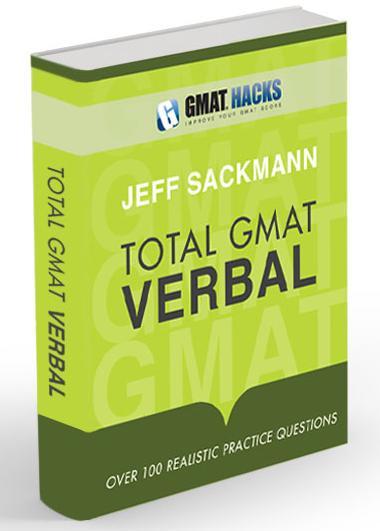
Bookshelf
|
|
Total GMAT Math Jeff's complete Quant guide, on sale now! |
|
|
Total GMAT Verbal Everything you need to ace GMAT Verbal! |
1,800 Practice Math Questions
Buy Jeff's books at Amazon.com

GMAT Official Guide, with IR
OG Math | OG Verbal
OG12 & Quant Rev solutions!
GMAT Question of the Day
Beginner's Guide to the GMAT
GMAT Hacks Affiliate Program

Recent Hacks

Categories
- General Study Tips
- Goals and Planning
- CAT Strategy
- The Mental Game
- GMAT Math Strategy
- GMAT Math Topics
- Mental Math
- Data Sufficiency
- Critical Reasoning
- Reading Comprehension
- Sentence Correction
- Analytical Writing Assessment
- Integrated Reasoning
- IR Explained
- Business School Admissions
- GMAT Prep Resources
- Practice Questions
- Total GMAT Math
- Total GMAT Verbal
- GMAT 111

It's a Marathon, Not a Sprint
| You should follow me on Twitter. While you're at it, take a moment to subscribe to GMAT Hacks via RSS or Email. |
Long-time readers know I really like analogies. Test-prep gets boring if you're just talking about the exam all the time.
I'm currently training to run a marathon in September, and as I read about training plans and techniques for runners, I'm often surprised by the similarities between preparing for a marathon and getting ready to take the GMAT. Even though one is largely physical and the other mental, the analogy is very strong.
For instance, I'm using an 18-week training plan that is divided into four segments: Endurance, Speed, Race Preparation, and Taper. These can be applied just as usefully to your GMAT preparation schedule.
Phase 1: Endurance
Before you're ready to attack the GMAT, you need to have a strong base--that is, you must learn (or re-learn) your math and grammar fundamentals. You must also develop a consistent study plan, especially if you've been out of school for a long time.
Most of my students work through Total GMAT Math and Total GMAT Verbal in this phase. They are designed to build up your skills so that you can approach the next phase of preparation with confidence. You can't run a marathon if you aren't physically able to log the miles, and you can't ace the GMAT if you don't have solid fundamental skills.
Phase 2: Speed
Once you are familiar with the test and its content and you have a solid study regimen, it's time to put those skills to good use. It's one thing to know how to handle difficult permutation problems, but a bigger challenge to answer those questions in two minutes or less.
To get back to the running analogy, your goal isn't simply to finish the marathon. That may be true for some runners, but it isn't an option the GMAT. You've got a time limit, and you have to learn to cope with it.
In this portion of studying, I have my students work primarily with The Official Guide. It's more difficult to answer questions when they aren't categorized by content area (as they are in many test-prep books, including my own). This is also the phase in which you should keep track of how long you're spending on every practice question.
Phase 3: Race/Test Preparation
For runners, training on a track or a treadmill isn't everything. You can't really be ready for race day until you've run a few races. This is the phase where you keep up your endurance and speed practice, but you include some more realistic preparation.
The analogy is clear. As you approach your GMAT test date, it's crucial to take a couple of practice tests. You'll find out whether your practice has accomplished what you think it did. You'll also discover what skills you need to work on in your remaining time.
Phase 4: Taper
This final phase is the most crucial for runners, and it is the most often ignored by GMAT test-takers. If you're running a marathon on Saturday morning, it isn't a very good idea to run hard every day for the two weeks leading up to it. This is obvious in the case of physical activity. To some extent it applies to mental activity as well.
I can't tell you how many people have shared their test-preparation stories with me and included something about their frantic cramming for the week before the test. If you've been preparing for weeks, even months, don't cram! There's no benefit to a couple of extra hours the night before, and there is probably harm.
Just as runners risk injury or poor performance from overtraining in the weeks before a race, so too do those taking important tests. It is difficult but important to recognize that you've worked hard for a long time. Your preparation efforts will pay off if and only if you get plenty of sleep the week before test, take it easy, and prevent exam-related stress from creeping into your life.
You don't need to start reading marathon training guides to aid your GMAT preparation, but there's a lot to be gained by thinking of GMAT preparation in terms of developing physical skills. Plan carefully, and you can ultimately reap the benefits.
About the author: Jeff Sackmann has written many GMAT preparation books, including the popular Total GMAT Math, Total GMAT Verbal, and GMAT 111. He has also created explanations for problems in The Official Guide, as well as 1,800 practice GMAT math questions.
 |
Total GMAT Verbal
The comprehensive guide to the GMAT Verbal section. Recognize, dissect, and master every question type
you'll face on the test. Everything you need, all in one place, including 100+ realistic practice questions. |